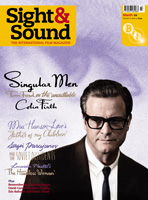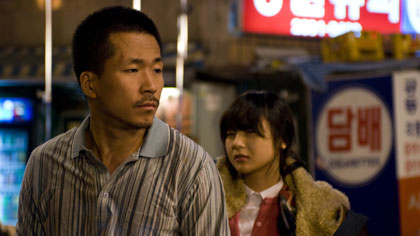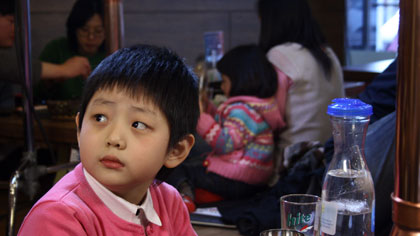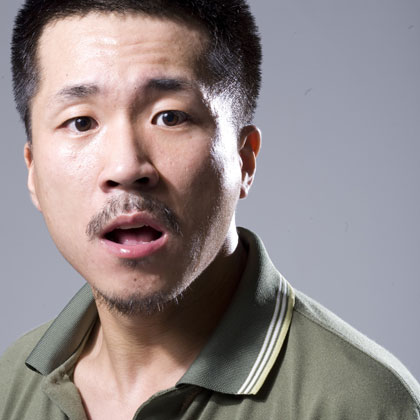Primary navigation


An astonishing debut for writer-director Yang Ik-june, who also stars, ‘Breathless’ confronts the violence in Korean society via the story of a brutal debt collector who strikes up a friendship with a schoolgirl. By Tony Rayns
As hard-boiled tales of moral redemption go, Breathless (Ddongpari) is a right knuckle-duster. It dramatises the vicious circles of violence which afflict some Korean working-class lives with an intensity that’s too much for some viewers, while its dialogue provides a comprehensive lexicon of Korean swear-words, adequately matched in the subtitles. But the film doesn’t follow the late Alan Clarke’s example by bombarding the audience with unmediated violence and despair. Yang Ik-june’s remarkable debut feature is certainly confrontational, but it’s also curiously good-hearted. Its ‘feel-good factor’ is rooted in the central odd-couple relationship between embittered hard man Kim Sang-hoon (played by the writer-director himself) and a much younger schoolgirl, Han Yeon-hee (Kim Kkobbi), who turns out to be as much a victim of familial dysfunction as he is. In essence, Yang finesses the generic twist dreamed up by Howard Hawks for Bogart and Bacall: he takes ‘the most insolent man on screen’ and trumps him with an even more insolent woman. Superbly played, it’s a joy to watch.
The film sets out its stance in a brief pre-credits scene. A man is beating up a woman on a street in Seoul at night, for reasons unknown. Sang-hoon, the film’s protagonist, happens along and lays into the guy, giving him serious punishment. Sang-hoon then sits the woman up and demands to know why she’s stupid enough to take such abuse; when she cannot answer, he slaps her hard. This is the film’s conundrum in a nutshell: the cycle of violence, fear, complicity and rage forms a perfect circle, with no obvious way out.
Breathless examines the impact of this cycle on both genders and all ages, from PlayStation-obsessed toddlers to an elderly alcoholic, the latter very possibly traumatised by his military service in Vietnam, but never treated for it. In contrast with the pre-credits scene, the central relationship kick-starts when the schoolgirl Yeon-hee slaps Sang-hoon for accidentally gobbing on her uniform. He slaps her back, of course, but it’s because both speak the language of reflex-action violence that their improbable friendship is possible.
Carefully plotted and very briskly paced, the film bangs through its exposition. Sang-hoon is seen reporting (late) for work, exchanging insults with his genial boss and ignoring the younger men who are squeezed into the tiny office. In short order we find out that he works as a strong-arm man, that he’s as violent and abusive towards his younger colleagues as he is to their victims, that he’s old-fashioned enough not to have a bank account or mobile phone (and to prefer fruit-machine games to CGI shoot-’em-ups), and that he has an inarticulate and ham-fisted concern for his young nephew, who is plainly terrified of him.
The first, chance encounter with Yeon-hee is also placed early in the film, the better to offset our escalating alarm at Sang-hoon’s capacity for mindless violence. Aside from the pre-credits vignette, the first time we see Sang-hoon in action is when he supervises the trashing of a student demonstration calling for the resignation of a university president. This scene is in a sense deliberately misleading, since the great majority of Sang-hoon’s violence will be directed against men who have defaulted on their payments to a loan shark, but it serves to establish that his world is innocent of politics. In his generalised hatred of authority figures, ironically he has more in common with the students than he realises.

The origin of Sang-hoon’s psychosis is presented in a flashback, triggered by his furious attack on two harmless patrol cops who challenge his behaviour towards Yeon-hee. As a child he witnessed his father beating his mother and then stabbing one of his sisters with a kitchen knife when she tried to intervene; he carried the sister to hospital on his back, only to be told that she was dead on arrival; his mother died the same night in a road accident as she followed him to the hospital. These ruinous memories are shown as ‘breathless’ fragments, a strategy that keeps the latent element of melodrama well in the background. The turning point, much later in the film, comes when Sang-hoon finds that his hated father has attempted suicide, and carries him to hospital as he once carried his sister. It’s the moment when Sang-hoon finally realises that he has become what he most hated. This, at last, suggests the way to break the circle of violence; it pushes the film towards a nuanced, bittersweet resolution.
The violence in Yeon-hee’s life is presented just as succinctly and just as vividly. Two domestic scenes in which she has to deal with both her vicious, waste-of-space brother and her deranged, alcoholic father are enough to explain her failure at school – and what it is about Sang-hoon that attracts her. The film is too smart to present the relationship as a romance (there’s no sex, although it does wonders for Yeon-hee’s sense of self-worth to announce herself as Sang-hoon’s girlfriend); the age gap between them is agonising at the climax, when she fails to grasp that Sang-hoon is having an emotional breakdown, and has no idea how to deal with it. Nonetheless it’s their joshing friendship, founded on reciprocal insults, which anchors the film emotionally and makes their generally hellish lives bearable.
All of this rings very true to the Korean audience, both sociologically and psychologically, and it’s a measure of Yang’s achievement that the film’s extremist actions and situations feel equally credible and affecting to non-Koreans. Yang films it in a way that highlights the performances: there are plentiful close-ups, wider compositions are functional rather than expressive, and handheld camerawork is restricted to explosions of rage (with most of the violence occurring just beyond the frame) and a couple of street-market montages. This rough-and-ready aesthetic was already working well in the best of Yang’s earlier short films, the 40-minute featurette Always Behind You (Baraman Bonda, 2005), in which he played a laddish photographer incapable of expressing his feelings for the girl he’s coaching. Performance was paramount there too. Yang (who has had supporting roles in a handful of commercial features) evidently casts himself because his roles in his own films draw on emotions he recalls from his adolescence, but his performances are the very opposite of narcissistic, and he couldn’t be more sensitive to the needs of his other actors.
Breathless could be seen as a contribution to the ongoing cycle of Korean movies focused on changing perceptions of male identity, a phenomenon interestingly broached by Kyung-Hyun Kim in his 2004 book The Remasculinization of Korean Cinema. But it’s no less interesting that the film appeared (it won a prize at the Pusan Film Festival in October 2008) at a time when the Korean film industry was going through one of its biennial crises: the bubble of industry growth had burst, ticket sales were down and there was widespread anxiety about the decline in film exports. Breathless, meanwhile, provided lessons which no one learned.
Yang made the film independently, on a smallish budget, boosted slightly by a grant from the Pusan Festival’s Asian Cinema Fund. He made exactly the film he wanted to make, without compromise, and it was taken up for distribution and sales by the ‘major’ Showbox. It attracted an audience of about 130,000 in Korea, spectacular for an indie film with no ‘name’ stars, and had notched up 14 international prizes at the last count, plus distribution deals in France, Japan, North America and other territories.
All this reflects the fact that Yang did exactly what other Korean film-makers had done in the mid-1990s, when Korean cinema first rose to international prominence: he took a subject that meant something to him, thought it through coherently, and shot it with the vigour and commitment of a Sam Fuller. Result: deserved success.

Yang Ik-june on his personal struggle to make ‘Breathless’
The film tells a story that’s very personal for me, that has to do with my family and background, though I’ve since come to see it as a broader view of some of the problems in Korean society. It was a therapeutic story to tell. I had so much anger and pent-up frustration that I wanted to get it out of my system. I took all of these different roles [actor, writer, director] because I wanted to live in my own story. It was overwhelming, but I was ambitious – I wanted to deliver in all those areas. With Korea’s violent history in the last century, it was inevitable that this kind of violence is to be found in Korean society. No country wants to expose its flaws to others, but we should express this. The film did cause shock in Korea. It’s not a comfortable film to watch, but at the same time I’ve had audiences thank me because it’s made them confront something inside. It’s an 18-plus movie, but I’ve been told that high-school teachers have recommended that their students watch the film. It was very difficult to get it made. I had to sell my house, borrow money from my friends and parents. But once I had finished the script I wanted to make it there and then. It might have been wiser to wait and get more funding, but I didn’t want to lose that urgency. I’ve since managed to repay everybody too, so perhaps I can borrow even more next time!
East meets Western: James Bell interviews Kim Jee-woon about his sci-fi Western The Good, The Bad, The Weird (February 2009, online exclusive)
Duelist reviewed by Tony Rayns (April 2007)
Vengeance is theirs: Grady Hendrix on the renaissance of Korean cinema (February 2006)
Kim Jee-woon interviewed by James Bell (February 2006)
Memories of Murder reviewed by David Jays (August 2004)
Spring, Summer, Augumn, Winter and Spring reviewed by David Jays (June 2004)
Sympathy for Mr. Vengeance reviewed by Ryan Gilbey (July 2003)
Chihwaseon Drunk on Women and Poetry reviewed by Geoffrey Macnab (June 2003)
The Isle reviewed by Richard Falcon (August 2001)
Lies reviewed by Tony Rayns (March 2000)